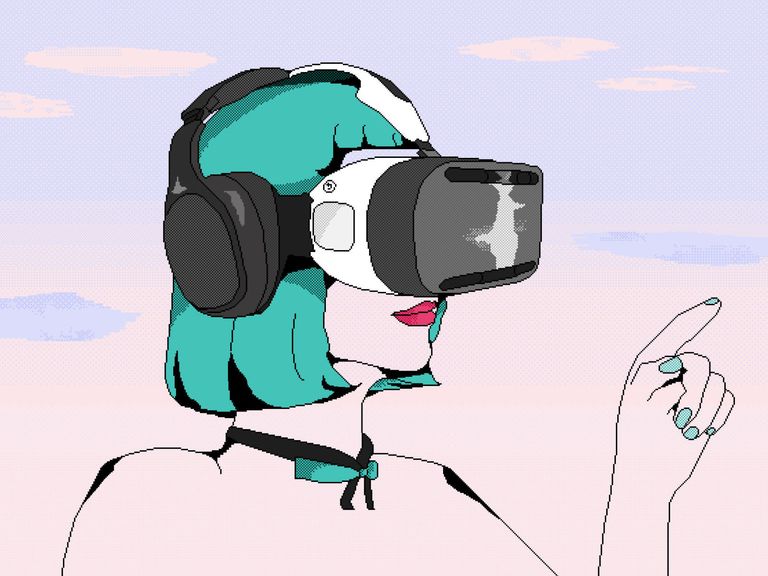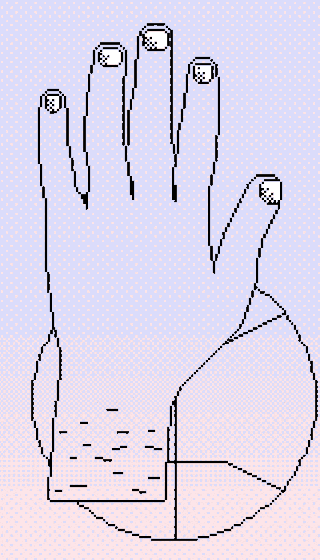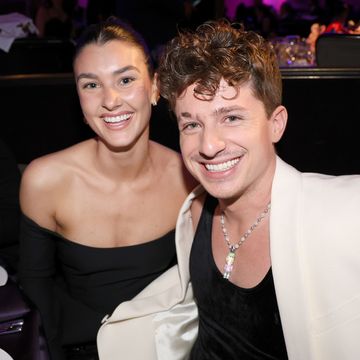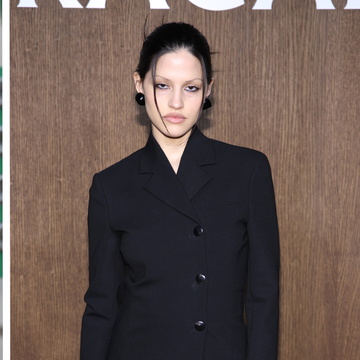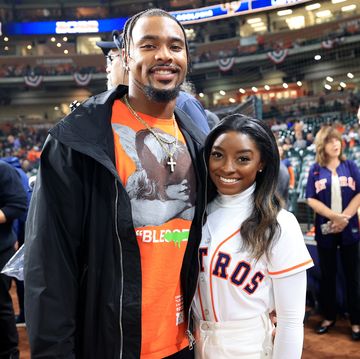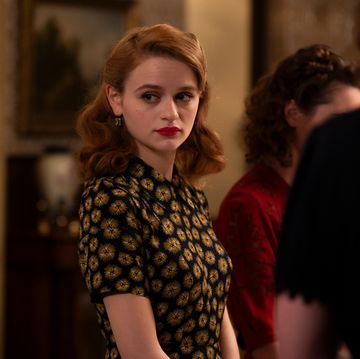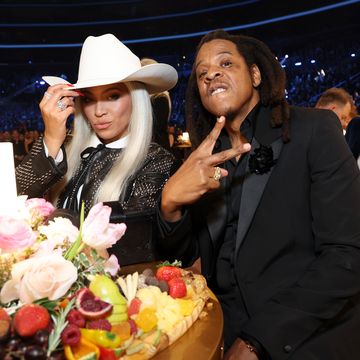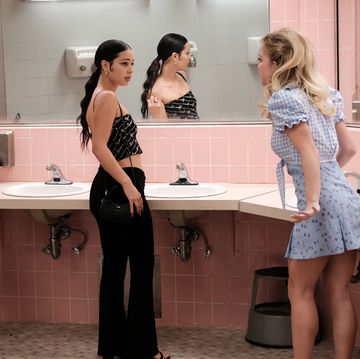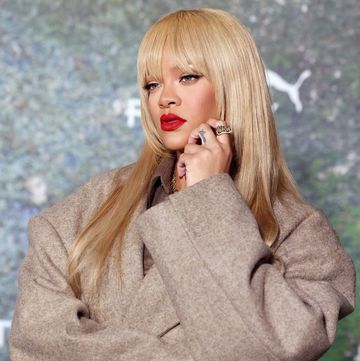I'm having trouble grabbing a basketball. They're lined up right next to me, on the same sort of rack we used during my high school basketball practices, but the balls are fuzzy around the edges. Every time I reach for one, it slips beyond my grasp. Then I realize I can pick one up: I aim, shoot, and—boom! Slam dunk. "Yes!" I squeal, pumping my fist. It's only then that I notice that my hand is a masculine one: larger than my own, with darker, coarser hair and short, square nails.
I'm actually in a padded room in San Francisco, trying out the new virtual reality sports experience from the Facebook-owned Oculus, one of the first major consumer VR companies. Slam-dunking, throwing a touchdown pass, flying, swimming with whales, and climbing Everest are the kinds of experiences that have turned me into a VR nerd over the past few years.
But then the commercial release of VR headsets drew near, and I quickly realized that to participate in the increasing number of demos, I would have to have a male avatar. VR has the potential to make us all kinder, fitter, and happier. It can be better than morphine at treating pain and can make us more likely to help others. But what happens when that potential is channeled through a deeply gendered lens? When not only the hands that you use to play basketball, but the eyes through which you see the world, belong to men?
Does it really matter if we carry the same stereotypes into another new technology? Study after study indicates that it will: for a start, virtual reality is a far more immersive and impactful medium than any other. "VR is a psycho-physical experience that ties mind and body together," says Howard Rose, who conducted some of the early FMRI studies on VR as a means to handle pain. He is now CEO of Deep Stream VR, a company that develops VR content for various medical applications. "It's many levels above passive media consumption. If you're watching a movie, you can't watch a movie harder or better, or throw yourself into it. "
Researchers have found that virtual reality experiences stay with people long after exposure to any other sort of media has faded. VR experiences are so immersive that people often confuse virtual reality with actual reality, he says. Experts are still studying how and why VR affects the brain so acutely, but they do know that by engaging sight, sound, and touch, it effectively tricks your brain into thinking that you are really in another place. "The human brain encodes VR as a place we've been rather than a thing we've seen," Rose says. Because of that, he says, VR has the potential to actually create memories.
What does that mean for women? It's something that concerns Ceek VR CEO Mary Spio, one of the few female VR founders. "Just imagine how much more people will be desensitized to so many different things, from objectification of women to unnecessary violence." "The impact of negative female stereotypes will be worse in VR," says Jesse Fox, a researcher at Ohio State University whosestudies on gender and virtual reality back up her concern. "People will actually be interacting with the stereotypes, so it will affirm gender assumptions one level deeper than traditional media might."
The industry is only just beginning to grapple with its potential societal impact and the responsibility that comes with it. Samsung and Sony have put age limits on their headsets; Oculus has banned the use of porn with its gear, primarily to avoid scenarios where people are acting out violent acts with women. Of course, there's already a hack around that restriction—a few lines of code easily found online will lead to all the porn you could want on your Oculus Rift. Still, says Jesse Fox, "it's a big step." There has also been some talkof a VR-specific rating system that would take into account its psychological impact. But for the most part, developers are in wait-and-see mode.
There has been a somewhat more proactive response in the world of social VR, which provides an environment where users virtually interact with real people. Developers for social VR are already taking action to combat sexual harassment. In the same way that women are targeted by trolls in digital realms like online games and Twitter, they've been targeted in popular social VR apps, like High Fidelity and Altspace, where they face everything from persistent and unwelcome chatting to more aggressive and sexually explicit harassment. And because researchers have found that harassment in VR is far more traumaticthan in other digital worlds, this has quickly become a pressing problem.
After female gamers (and a few men, too) took to Reddit to complain about rampant harassment, Altspace improved its failsafes—namely, 24-hour moderation and a toggle that enables anyone using the app to block any other user who might be bothering them. (High Fidelity says they're also implementing measures for blocking or dealing with harassment.) "The first time I tried [social VR] I had someone come in and 'give me a kiss," a female Redditer commented. "In reality, that was just me stuck in a chair with some weirdo's avatar close up in front of me for 20 seconds. I haven't played it again since."
"Harassment is something that still needs to be worked out in VR—it happens in every digital space, so we know it's going to happen here," says Jazmin Cano, a High Fidelity 3D artist and content creator. "Creators can't violate the trust of viewers. VR is so intense, and actions that happen while immersed have immediate consequences. If these tools aren't set in place and available for users, we risk the possibility of people being hurt—then they won't come back to VR in general, and it will hurt the industry as a whole."
Spio says making sure more women find their way into the industry should help, too. "I saw a picture of a big VR conference recently and it was just a sea of young men in headsets, and I thought, 'yay, more first-person shooters,'" she says. "We need to get more women into the industry to get a better balance of content."
Anecdotally, that seems to be happening: a "women in VR" Facebook group boasts more than 1000 members; the networking group VR Girls has hundreds of members; and there's been an explosion of "women in VR" panels and meetups recently. That's all promising news, but it will take time for VR to strike a gender balance both behind and in front of the camera.
In the meantime, the industry continues to hurtle forward, largely unrestricted, and dominated by games and films that glorify violence and objectify women in the same way that media always has. "Look, these racial and gender stereotypes have been around forever, even in textbooks," Spio says. "They're not going anywhere any time soon. But what we can do is create positive content that balances that stuff out and provides another option."
